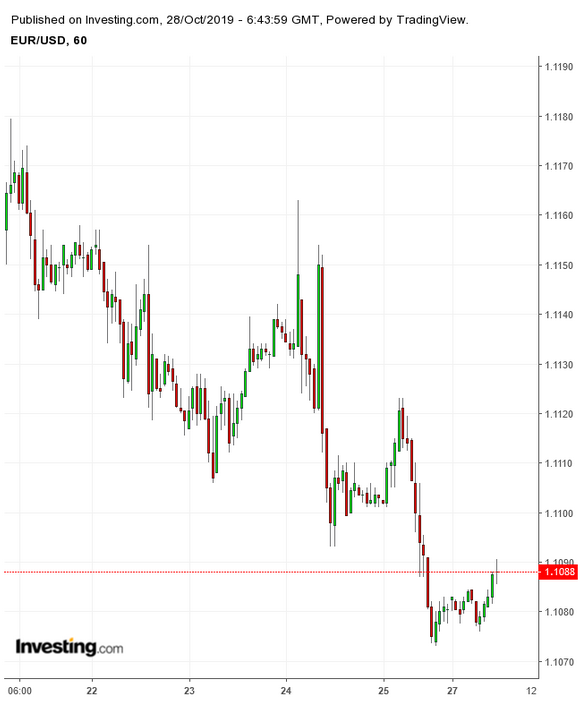If it was not exactly a bang that marked Mario Draghi’s departure as European Central Bank (ECB) president, it certainly wasn't a whimper either. Even as the press dissected his aggressive monetary policy, after his final, official press conference last Thursday—especially his introduction of quantitative easing and negative interest rates into the central bank toolkit—he robustly defended the bank’s policies, including the accommodative measures decided on in September.
At last week's press conference, Draghi expressed his sense of vindication regarding the controversial September measures. “Unfortunately, everything that’s happened in September since our monetary policy decisions has shown abundantly that the governing council’s determination to act in a substantive manner was justified,” he said in response to a question.
Draghi deftly deflected questions about German criticism, disunity in the governing council, his possible future as president of Italy or any plans for after ECB. After eight years in what at times seemed like an impossible job, he did acknowledge what he considers part of his legacy: “Never give up.”

What nobody can forget is that the euro would probably not exist today were it not for his 2012 declaration that the ECB would do whatever it takes to preserve the EU’s joint currency.
Nor should they forget that Europe would certainly be in the grip of a recession now, had the former president of the Banca d’Italia not stood up to Bundesbank president Jens Weidmann and other hawks from northern Europe who wanted to tighten monetary policy.
Maybe that would be better in the long run, one could argue. Take your medicine and bide your time for the recovery, rather than simply postpone the inevitable with tactics that could have unforeseeable side effects.
However, with his monetary policy, Draghi was simply following the lead of Ben Bernanke’s Federal Reserve (though the Fed has not found it necessary to dip into negative interest rates). What he did not get with the EU’s fragmented fiscal policy that the U.S. did, is any flanking support from government spending to accompany the monetary stimulus.
Worse, though, was the impact of the joint currency itself, skewing the balance of payments among EU members to support the bloc’s strongest economy, Germany, while relentlessly punishing weaker economies in Greece, Spain, Portugal and Italy.
Germany, ruthlessly benefiting from an artificially depressed currency, sailed along with current account surpluses and low unemployment, while the southern countries faced staggering debt, astronomical unemployment, riots in the street, and a bitter “internal devaluation” of lower salaries and reduced pensions.
Still, this was not Draghi’s problem to solve. A committed European, he did what he could to salvage what history may eventually label as the failed experiment of a single currency. The problems plaguing Europe now cannot be laid at his door, despite the jeremiads in Germany about the long-term effects of negative interest rates and central bank bond purchases.
Draghi was not the one who exploited the anomalies of the joint currency in Germany’s favor. Rather, German chancellor Angela Merkel, who steadfastly put German voters first, is the one who insisted on bending the southern countries to her will, at whatever costs to its citizens.
Merkel has begun to realize her mistake and held out an olive branch of sorts with the nomination of University of Bonn economist Isabel Schnabel to the ECB executive board rather than another ideologue from the Bundesbank. Schnabel, who has a less dogmatic view of monetary policy, sensibly observed that you cannot expect Europe to work if you keep making the EU and the ECB the scapegoat for all your ills.
But it is probably too late. A north-south divide embedded in the very structure of the euro has widened and is probably unbridgeable. Perhaps Draghi’s successor, Christine Lagarde, does have the diplomatic skills attributed to her. Should that be the case, she might be able to reconcile the divisions in Europe.
Nevertheless, her tenure at the International Monetary Fund was hardly without controversy. The international lending agency violated numerous rules to ease the euro crisis.
And it is ironic that the European Parliament rejected Banque de France deputy governor Sylvie Goulard for the new European Commission over the bagatelle of having an EU staffer work on domestic politics while ignoring the much more serious court censure given to Lagarde for the hundreds of millions lost to French taxpayers in the Bernard Tapie affair.
What does all this tell us about the future monetary policy of the ECB? First, monetary policy is not the root of the EU’s problems and nothing Lagarde will do can solve those problems.
Second, Brexit has more to say about the future of Europe than the ECB. The fact that the British voted to leave, that the EU made it devilishly hard for them to do so, and that the UK will handily survive with or without a transition deal should be a lesson for every country that feels there is no alternative to the centralizing bureaucracy in Brussels.
Third, the very division that bedevils the ECB—based largely on Germany’s insistence on having things its way—continues to the block the EU’s banking union, capital markets union, joint budget and all the other factors that make the U.S. so much more successful economically than a half-baked European Union.
